|
|
|
Sort Order |
|
|
|
Items / Page
|
|
|
|
|
|
|
| Srl | Item |
| 1 |
ID:
131444
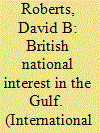

|
|
|
|
|
| Publication |
2014.
|
| Summary/Abstract |
The British government is in the process of re-energizing its relations with the Gulf states. A new Gulf strategy involving a range of activities including more frequent elite bilateral visits and proposals sometimes touted as Britain's military 'return to east of Suez' are two key elements of the overarching strategy. Such polices are designed to fall in line with British national interest as identified by the government-authored 2010 National Security Strategy (NSS), which emphasizes the importance of security, trade, and promoting and expanding British values and influence as perennial British raisons d'etat. In the short term, the Gulf initiatives reflect and compliment these core interests, partly based on Britain's historical role in the region, but mostly thanks to modern day trade interdependencies and mutually beneficial security-based cooperation. However, there is yet to emerge a coherent understanding of Britain's longer-term national interest in the region. Instead, government-led, party-political priorities, at the expense of thorough apolitical analysis of long-term interests, appear to be unduly influential on the origins of both the Gulf proposals and the NSS conclusions themselves. Without a clear strategic, neutral grounding, both the Gulf prioritization and the NSS itself are weakened and their longevity undermined.
|
|
|
|
|
|
|
|
|
|
|
|
|
|
|
|
| 2 |
ID:
171986
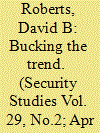

|
|
|
|
|
| Summary/Abstract |
The literature examining national militaries in the Arab world paints a near-universally bleak picture of their capabilities. Some argue issues rooted in “Arab culture”—so-called essentialist rationales—fatally undermine military effectiveness. Others assert that regime security concerns encourage leaders to actively politicize, coup-proof, and consequently weaken their military. This article challenges these literatures by demonstrating that United Arab Emirates (UAE) forces have repeatedly exemplified unusual levels of military effectiveness and sophistication in hostile campaigns. Using approaches from public policy studies (the Advocacy Coalition Framework), this paper investigates how the UAE military bucked the trend. The 1990 invasion of Kuwait was a “focusing event” that prompted a rethink of existing approaches. Catalyzed, a key “policy entrepreneur,” Abu Dhabi Crown Prince Mohammed bin Zayed Al-Nahyan, changed approaches to training, unified federal militaries, and tested forces in challenging operations. Such findings undercut lingering essentialist critiques of Arab militaries, provide a potential pathway for other states to emulate, demonstrate that secure and motivated leaders can overcome coup-proofing concerns, and showcase the fruitful pollination of methodologies from public policy to security studies.
|
|
|
|
|
|
|
|
|
|
|
|
|
|
|
|
| 3 |
ID:
178581


|
|
|
| 4 |
ID:
178970
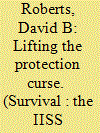

|
|
|
|
|
| Summary/Abstract |
As the UAE and Saudi Arabia find they can increasingly do without US support, they are likely to emerge as less restrainable regional actors.
|
|
|
|
|
|
|
|
|
|
|
|
|
|
|
|
| 5 |
ID:
132464
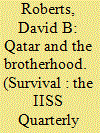

|
|
|
|
|
| Publication |
2014.
|
| Summary/Abstract |
In June this year, an Egyptian court's decision to sentence three Al-Jazeera journalists to lengthy prison terms marked a new low in deteriorating Qatar-Egypt relations, but was only one among many international-relations difficulties that the small Gulf state has faced in recent years. The tenure of Emir Tamim bin Hamad Al Thani, who ascended to the throne in summer 2013, has been something of an annus horribilis for Qatar, even in terms of the country's relations with its fellow Gulf Cooperation Council (GCC) states, with which it has much in common. Against a backdrop of sporadic intra-regional problems, the latest iteration of these difficulties crystallised in early March, when Saudi Arabia, the UAE and Bahrain took the unprecedented step of withdrawing their ambassadors from Qatar en masse.
|
|
|
|
|
|
|
|
|
|
|
|
|
|
|
|
| 6 |
ID:
155889


|
|
|
|
|
| Summary/Abstract |
During the Arab Spring, Qatar tended to support the Muslim Brotherhood and its affiliates, while the United Arab Emirates opposed them. This article argues that, despite these states' ostensible similarities, their different political structures fostered contrasting experiences with an ascendant political Islam. Subsequently, the policies reflected each leader's approach to statecraft: Abu Dhabi crown prince Muhammad bin Zayid Al Nahyan, who steers Emirati foreign policy, reacted with a security-focused check on such groups, while the former Qatari emir Hamad bin Khalifa Al Thani sought to build relations with them.
|
|
|
|
|
|
|
|
|
|
|
|
|
|
|
|
| 7 |
ID:
148364
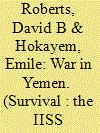

|
|
|
|
|
| Summary/Abstract |
The Yemen intervention has ushered in a new era in the Gulf's security discourse and, perhaps, praxis.
|
|
|
|
|
|
|
|
|
|
|
|
|
|
|
|
|
|
|
|
|